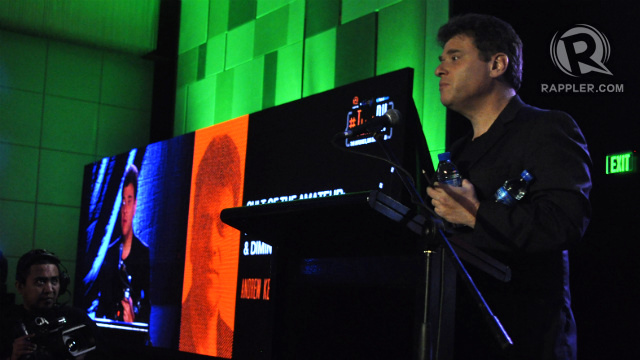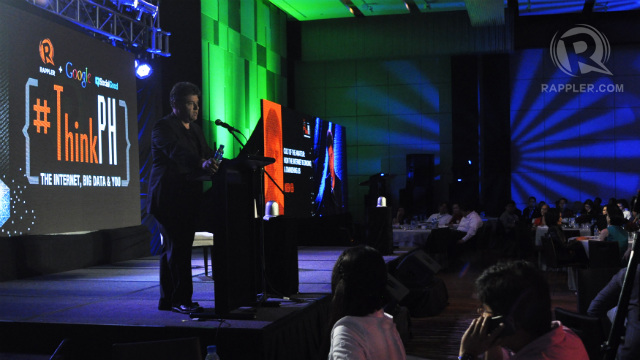SUMMARY
This is AI generated summarization, which may have errors. For context, always refer to the full article.

MANILA, Philippines – It was a room full of bloggers, online journalists, and other Internet users gathered for the big data summit #ThinkPH on Friday, August 23.
But Andrew Keen, a US-based author who flew in for the summit, pulled no punches in blasting the Internet as an “epic failure” nearly 25 years after its invention.

Jumpstarting the summit as its first speaker, he minced no words against one of the organizers, Google, which he called a “central character” in the Internet’s failure. Well, Keen called himself “the nicest anti-Google guy you’ll ever find.”
“I wanna argue today that the first 25 years of the Web experience has, for the most part, been a failure. That’s why I’m going to calI my next book ‘Epic Fail.’ It’s failed in most respects… It doesn’t mean it hasn’t changed the world; in fact it has changed the world. That’s why it’s so important to have this conversation,” Keen said in the #ThinkPH summit organized by Rappler, Google, and +Social Good at the New World Hotel in Makati.
He likened the Internet to a person who, upon reaching the age of 25, should have grown more accountable.
“Guys, it’s time to grow up. It’s time to get together to be more responsible… You’ve got to become more accountable for the world you are creating,” Keen said.
Keen, an Internet entrepreneur, authored the books Cult of the Amateur: How the Internet is Killing Our Culture and Digital Vertigo: How Today’s Social Revolution is Dividing, Diminishing, and Disorienting Us. It was his first time to visit the Philippines.
The day-long #ThinkPH summit brought together international and local experts to discuss big data – its uses and potentials in transforming democracy.

‘Nothing good about free’
In his 45-minute speech, Keen blasted Google as “the nicest monopolists around.”
“The villain, unwillingly in some ways and consciously in others – the villain in Cult of the Amateur, the driving force, the central character in the Web 2.0 revolution – is Google. What Google figured out was that they could cleverly leverage our collective intelligence. The more we used the Google search engine, the more intelligent it became… What Google figured out to do was a way of creating content without paying for that content,” Keen said.
He added: “The artificial algorithm, the secret sauce of the Google economic miracle, is built by all of us. It’s user generated content… It’s a weird kind of economic arrangement. We’re doing the heavy lifting, the algorithm, or at least the algorithm’s intelligence, and Google reaps the economic benefits.”
He said this is problematic, especially when it comes to distributing this content for free.“This has generally been a bad thing for the creative industry.”
He added free content, in particular, has negatively affected the revenues of artists. “There’s nothing good about free… Free is a catastrophe. Free is cultural abomination,” Keen said.
‘Social good is bad’
The problem with the “Faustian deal” with Google, he added, is that this technology allows Google to know us better than we know ourselves.
He said the world is watching the rise of the new monopolies – the flow of wealth going to Silicon Valley. He noted that industry elites have been replaced by digital elites.
On big data, Keen said the same arguments apply: the threat of the internet because we reveal more about ourselves.
“It’s deeply troubling… We’re losing our privacy. We’re revealing everything about ourselves on the network. We’re living in an age of narcissism, where we think it’s somehow cute to reveal everything about ourselves, but actually it’s undermining us,” he said.
The author also criticized the idea of “social good,” which involves using the Internet to improve society. What is bad, he said, is not the “good” but the “social.” He asked, why should everything be social?
“Social, in my view, is for the most part bad. The architecture of the Internet is constructed to make is social. But social is disturbing… It results in a world of conformity,” Keen said.
He said the challenge is “thinking for ourselves.” “We need to strengthen the individual to create stronger social structures,” Keen said.
The author stirred the audience, who discussed his statements online. On Twitter, Rappler executive editor and CEO Maria Ressa quipped: “I thought we needed to be challenged. He’s a great conversation starter, isn’t he?”– Rappler.com
Add a comment
How does this make you feel?
There are no comments yet. Add your comment to start the conversation.